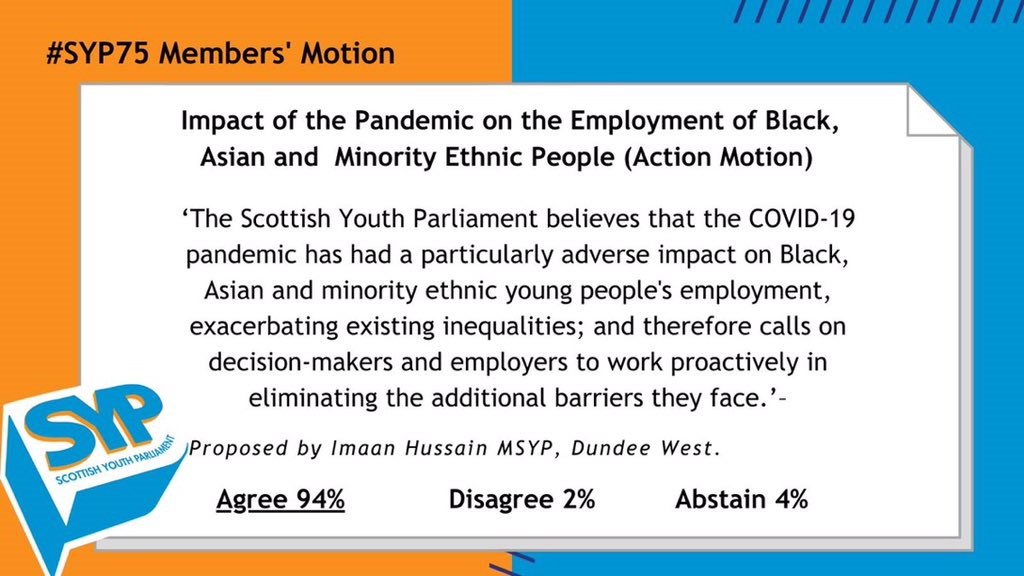At a time when decision makers are pressured to tackle the fall-out from the Covid-19 pandemic on numerous fronts, is it worth trying to tackle the deep-rooted racial inequalities impacting young People of Colour in Scotland?
My answer is Yes, and hopefully by the time you finish reading this blog, you will also be convinced of the need for action!
At SYP’s June Sitting, I put forward a motion which stated that:
The Scottish Youth Parliament believes that the COVID-19 pandemic has had a particularly adverse impact on Black, Asian and minority ethnic young people’s employment, exacerbating existing inequalities; and therefore, calls on decision-makers and employers to work proactively in eliminating the additional barriers they face.
94% of MSYPs agreed with this statement. But why is it important?
- People of Colour are more likely to be employed in lower-paid front-line jobs and face wage gaps of more than 15% compared to their white peers. [Brewer et al., 2020]
- The Covid-19 pandemic has had detrimental consequences on the employment opportunities and mental and physical health of young People of Colour. [Bracke et al., 2021]
- People of Colour have had, and continue to have, an increased susceptibility to Covid-19, due to various pre-disposed health conditions, prevalence within highly affected and vulnerable occupations, and the absence of key support services during the various lockdowns. [Campbell, 2020]
The tragedies faced by young People of Colour will have a ripple effect for generations to come, particularly on education pathways, access to employment opportunities and representation, which will further exacerbate their barriers to employment.
So how can we change it? By collective action and by working together!
Why does the change have to take place?
In 2020, the Scottish Youth Parliament, alongside Young Scot and YouthLink Scotland, carried out research that demonstrated a need for actions. The Lockdown Lowdown reports asked young People of Colour about their experiences, and they told us:
“There’s two different situations, [People of Colour] haven’t been able to go to work because … they don’t want to put themselves at risk, they don’t want to put their kids at risk, they don’t want to put their family at risk, so they haven’t been able to go to work which is hurting their finances. Or they are having to work where they are putting themselves into danger which … isn’t like a good option either.” [Participant – Lockdown Lowdown 2.0 Report]
“A specific group of Black people affected more – carers, hospital workers, nurses, service-industry people, bar-tenders, those were the people who we saw being discriminated against” [Participant – Lockdown Lowdown 2.0 Report]
So, what can decision makers do about it?
SYP’s current national campaign, Bounce Back, calls for decision-makers to take a rights-based approach to recovery from the pandemic. In March 2021, the Scottish Parliament voted unanimously to incorporate the UN Convention on the Rights of the Child (UNCRC) into Scots Law. The UNCRC applies to every child up to the age of 18, regardless of their sex, religion, language, abilities, ethnicity, or any other status. By committing to uphold young people’s rights, Scotland has committed to ensure all children and young people’s rights are respected and are legally upheld.
For young People of Colour, a rights-based approach to recovery will ensure we are not discriminated against in the workplace, that we have equal access to employment opportunities, and that we do not have to make the decision between paying rent and putting food on the table or putting our lives at risk.
Structural inequalities, as demonstrated by the killing of George Floyd and the protests thereafter, and more recently the negative reaction towards three young black footballers missing penalties for their national team, show that our society is pervaded by inequalities. Covid-19 only makes it worst. But it would be wrong to think that Covid-19 in itself is to blame. In research in 2019 by Nuffield College, Oxford University, they found that ethnic minority candidates had to send ‘60% more applications in order to receive as many call backs as the majority group’ despite having identical CVs. [Centre for Social Investigation, 2019]
For many young People of Colour, there are ‘uneven steps’, ‘glass ceilings’, ‘ladders to Nowhere’ and numerous other barriers that affect young People of Colour. If decision-makers do not do something to tackle these barriers now, then when?
How you can help!
| Get connected: Support organisations and individuals taking action to improve racial equality. By Volunteering, donating or by showing support through social media. Have difficult conversations: Be an ally, and call out If you see young People of Colours’ rights aren’t being upheld. |
References
Centre for Social Investigation (2019), ‘New CSI research reveals high levels of job discrimination faced by ethnic minorities in Britain’, Available online at: http://csi.nuff.ox.ac.uk/?p=1299
Scottish Youth Parliament (2020), ‘Lockdown Lowdown 2.0’, Available online at: https://syp.org.uk/wp-content/uploads/2020/12/Dec2020-LockdownLowdown-Voice-Seldom-Heard-Groups-COVID19-Pandemic-Updated-December-2020.pdf
Resolution Foundation (2021), ‘Uneven Steps’, Available online at: https://www.resolutionfoundation.org/app/uploads/2021/04/Uneven-steps.pdf
Bracke, P, Croxson, K, Leary, J and Wood, J (2021), ‘Covid-19 and the UK’s BAME communities – an economic perspective’, Available online at: https://www.fca.org.uk/insight/covid-19-and-uk-bame-communities-economic-perspective
Brewer, M, Cominetti, N, Henehan, K, McCurdy, C, Sehmi, R and Slaughter, H (2020), ‘Jobs, Jobs, Jobs’, Resolution Foundation
Campbell, D (2020), ‘Covid-19 affects BAME youth mental health more than white peers-study’, Available online at: https://www.theguardian.com/society/2020/jun/21/covid-19-hits-bame-youth-mental-health-worse-than-white-peers-study



